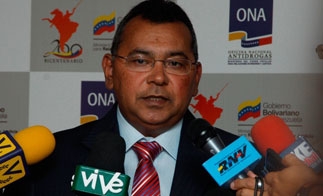Venezuela has proposed the creation of a regional intelligence fusion center to monitor drug trafficking, reflecting a growing trend toward Latin American security cooperation.
On June 18, Venezuela proposed creating a South American intelligence center to monitor drug trafficking in the region. According to Venezuelan Vice Minister of Public Safety Nestor Reverol (pictured above), the system will monitor maritime and aerial transportation in the region and will promote shared intelligence among South American countries so that they will be able to develop independent strategies to combat drug trafficking. The proposal will be raised before the Union of South American Nations (UNASUR).
Venezuela posed the idea at an international seminar on drug trafficking in Porlamar, Venezuela, which brought 42 experts from South America, as well as representatives from international and European governmental bodies, together to discuss the changing methods of shipping drugs to Europe and West Africa, as well as also the emergence of new synthetic drugs, such as bath salts and synthetic marijuana.
It is not yet clear who would direct the creation of the South American monitoring system and when it would be established.
InSight Crime Analysis
For Venezuela, combating drug trafficking is a key component of its national security. The South American country is a well-known haven for drug traffickers, and is a transition point for cocaine produced in Colombia and then shipped via Venezuela to the Caribbean, West Africa, and Europe. Many top Colombian drug lords are suspected of residing in Venezuela, including Daniel Barrera, alias “Loco Barrera.”
The Venezuelan proposal is reflects a growing trend toward regional cooperation in fighting drug trafficking. In April at the Sixth Summit of the Americas, all 33 attending countries voted to establish an Inter-American System against Organized Crime. This monitoring system will be made up of regional security and law enforcement experts and officials, and is expected to make policy recommendations for countries in the region. It will coordinate its efforts with the Organization of American States (OAS) — an organization that Venezuelan President Hugo Chavez has criticized in recent years.
Both the Inter-American System and UNASUR intelligence center, if well organized, could promote the sharing of strategy and intelligence necessary for an effective fight against drug trafficking. Although both bodies are designed to combat drug trafficking, the Inter-American System appears designed to promote policy dialogue between Latin American countries, while the Venezuelan plan, albeit vague, focuses on another important aspect of regional drug enforcement: intelligence sharing.
However, considering widespread allegations of corruption among Venezuela’s military forces, the country’s South American neighbors might be reluctant to entrust classified information to the Venezuelan military.

